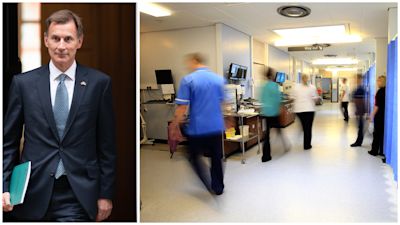Insight
Why won’t Treasury fund £1,000 nurses payment?

A one-off payment of £1000 each for a million NHS employees - nurses, ambulance workers, physios, midwives and so on - would probably end the industrial action that is turning an NHS that's under extreme pressure into an NHS under unbearable pressure.
And although such a payment was not discussed per se in today's talks between trade union reps and the health secretary Stephen Barclay, there is an understanding on both sides that such an exceptional cost-of-living payment, of the sort that has become commonplace in the private sector, would break the deadlock.
The trade unions tell me this. The Department of Health and Social Care tells me the same.
If they are not yet precisely on the same industrial page, they are close.
There is belated convergence between them on how to get the strikes called off (though it's too late for Wednesday's by ambulance workers to be cancelled).
So why hasn't the offer been made? The reason is straightforwardly that it is not an offer that Barclay and the DHSC can make because although it would cost £1bn for one year only, which is well under 1% of the NHS's budget, they don't have the money.
There would need to be new money, provided by Jeremy Hunt and the Treasury. So why doesn't Hunt just cough it up? After all in the context of current public sector net debt of £2.6 trillion, an extra £1bn is smaller than a rounding error.
Funding the one-off ex gratia £1000 would not be a return to the magic-money-tree economics of Johnson and Truss, which Hunt and Sunak are desperate to avoid.
But the Treasury and Sunak also cautious about offering the cash because they see it as sticking plaster that will have to be applied again next year, and maybe again the following year.
They fear it won't be a one-off, however much the health department wants to believe it would be.
In other words, and Barclay did make this clear in talks, there won't and can't be a sustainable resolution to the dispute unless and until a framework is agreed by unions and NHS employers, led by Barclay, that frees up resources to fund inflation-plus pay rises in the medium term.
And that means an agreement on new working practices that increase output, that raise productivity.
For the avoidance of doubt just talking about productivity improvements feels like an insult to those million plus NHS workers who are working flat out, are demoralised, and are exhausted.
There is more goodwill in the negotiations than there has been.
There is no solution, yet.
Want a quick and expert briefing on the biggest news stories? Listen to our latest podcasts to find out What You Need To Know.